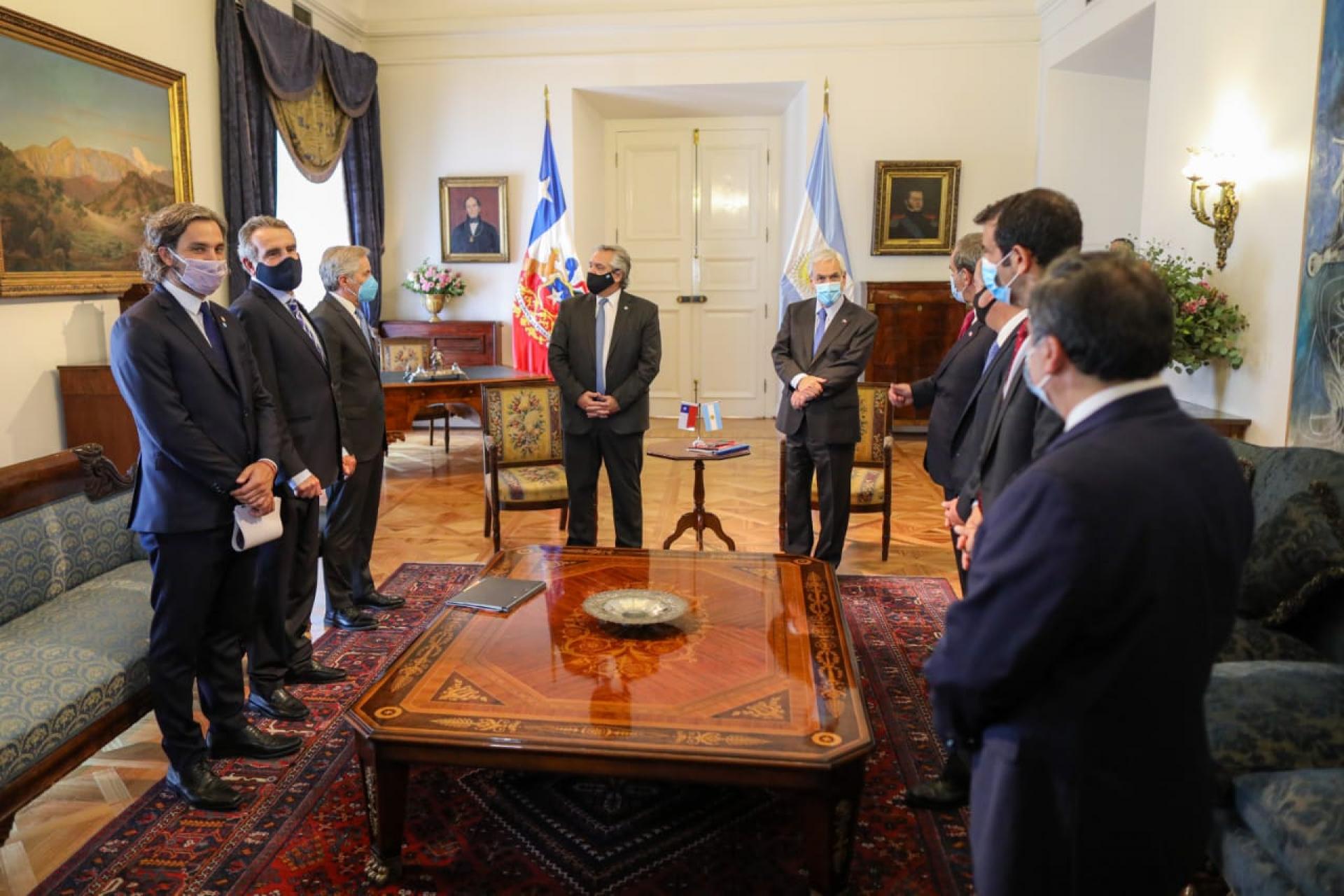Within the context of his State Visit, President Alberto Fernández with his Chilean counterpart, Sebastián Piñera, headed a ceremony that included the signing of agreements and a Joint Statement at the Chilean House of Government, Palacio de la Moneda, and stated that “Argentina and Chile are linked by an inseparable bond”.
“I am here with President Piñera to see how we, Chileans and Argentines, face the future together and in unity, the way it should be, and to see how we can get our countries and the continent back on their feet after such a hard blow as the pandemic” said the Argentine President.
President Sebastián Piñera, for his part, stated that “this visit shows the willingness and commitment of both governments and countries to continue strengthening our historic and deep bonds of friendship and cooperation.”
The Chilean President described this first visit of President Fernández to Chile as “fruitful and productive” because it helped to chart a “road map to continue strengthening the bonds of friendship and cooperation between Argentina and Chile.”
The Presidents’ remarks were made during the ceremony that included the signing of agreements and a joint statement in the Patio de los Naranjos of Palacio de la Moneda.
First, a cooperation agreement on healthcare was signed by the Argentine Minister of Health, Ginés González García and the Chilean Ministers of Foreign Affairs, Andrés Allamand, and Health, Enrique Paris.
Next, the Foreign Ministers of Argentina and Chile, Felipe Solá and Andrés Allamand, agreed on establishing a new operation and coordination system for the integrated border control at the San Sebastián crossing, located north of Tierra del Fuego’s Isla Grande, in facilities in both countries.
The integrated control area will consist of the access road, starting from the facilities and extending to the international border, and both countries will bear the costs of upgrading and operation, including maintenance, repairs and improvements necessary for the normal functioning of the facilities located in their respective territories and for their officials to carry out their duties.
The Foreign Ministers also signed an agreement on the mutual recognition of driving licences, which will allow Argentine and Chilean citizens to temporarily drive vehicles in their neighbouring countries with their valid driving licences, without the need to pass the theory and practical driving tests in the other country.
Finally, Presidents Alberto Fernández and Sebastián Piñera signed a joint statement that specifically focuses on issues of connectivity, infrastructure, physical and digital integration, border facilitation, bilateral trade expansion, and health, science and tourism cooperation.
The document also renews the support of the “Government of Chile for the legitimate sovereignty rights of the Argentine Republic over the Malvinas, South Georgias and South Sandwich Islands and the surrounding maritime areas” and reaffirms the need to resume “negotiations in order to find, as soon as possible, a peaceful and definitive solution to the sovereignty dispute.”
In the document, the Presidents highlighted the close coordination between the border and road management services of both countries and the progress made on border facilitation and streamlining.
They also expressed their satisfaction over the elimination of roaming service charges between both countries, and agreed that the project on the trans-Pacific underwater cable that will connect South America with the Asia-Pacific region is of strategic importance to both Chile and Argentina and fosters regional integration.
The joint statement signing ceremony was attended by the Chief of Cabinet, Santiago Cafiero; the Foreign Minister, Felipe Solá; the Minister of Defence, Agustín Rossi; the Minister of Health, Ginés González García; the chief-of-staff to the President, Julio Vitobello; the Communication and Press Secretary, Juan Pablo Biondi; the Adviser to the President, Cecilia Nicolini; and the Argentine Ambassador, Rafael Bielsa.
Also present at the ceremony were the Governors of Catamarca, Raúl Jalil; La Rioja, Ricardo Quintela; Salta, Gustavo Sáenz; and San Juan, Sergio Uñac.
The Chilean delegation included the First Lady, Cecilia Morel; the Minister of Foreign Affairs, Andrés Allamand; the Minister of Interior, Rodrigo Delgado; the Minister of Health, Enrique Paris; the Minister of Defence (S) Cristián de la Maza; and the Chilean Ambassador to Argentina, Nicolás Monckeberg.



